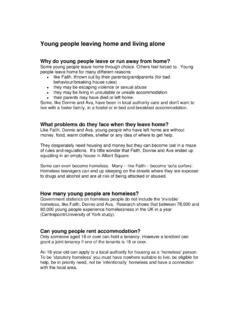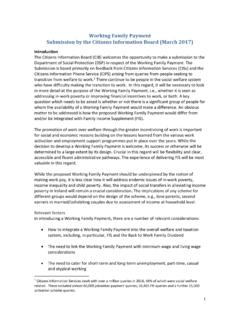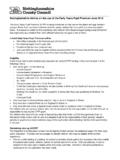Transcription of Are the children ‘in need’ due to destitution? …
1 May 2013 Section 17 of the children Act 1989 Section 17 of the children Act 1989 ( ) gives local authorities the power to provide accommodation and financial support to families with children in need , even if they have no recourse to public funds. Establishing eligibility for support: 1. Which local authority should the family approach? The family should approach the local authority in which they live, unless they are already receiving support from a different local authority. 2. Are the children in need due to destitution? Destitution can cause a child to be considered in need for the purposes of if it is likely to effect his or her development or health1. There is no legal definition of destitution. However, it is a high threshold (much higher than the test for welfare benefits). The test most commonly used is: - No adequate accommodation; or - Unable to meet basic living needs If there is domestic abuse in the home, the accommodation is unlikely to be adequate.
2 The local authority should carry out a destitution assessment to establish this. 3a. Are the adults excluded due to immigration status? Some adults are excluded from accessing support under because of their immigration status2. If a caller falls into one of the following categories, they are excluded 1 See section 17(10) children Act 1989 from accessing support by schedule 3 of the Nationality, Immigration and Asylum Act 2002: - Granted refugee status by another EEA state - Citizens of other EEA states - Refused asylum seekers who have failed to cooperate with removal directions - People in the UK in breach of the immigration rules (except asylum seekers). This means: o Present in the UK without a right of abode or leave to enter/remain o Not entitled to remain in the UK under EEA treaties o Not exempted from the need to have leave ( diplomats, forces personnel)3 - Refused asylum seekers who have not taken reasonable steps to leave the UK b.
3 If excluded, would failure to provide support breach the family s human rights If the family falls into one of the excluded categories (above), they may still be able to access support if failing to provide support would breach a person s rights under the European Convention of Human Rights or EU law. Where there are no alternative forms of support and the family is not able to leave the UK for legal or practical reasons, leaving the family destitute may amount to inhuman or degrading punishment 4 or an unjustified interference with their right to a private or family life5. In such cases, local authorities may have a duty to provide support. This could be the case where: - The family is waiting for the UKBA to make a decision on an application for leave to remain based on human rights grounds6; or 2 See section 54 and schedule 3 of the Nationality, Immigration and Asylum Act 2002 3 See R (AW) v Croydon LBC [2005] EWHC 2950 (Admin 4 See Article 3 of the European Convention of Human Rights 5 See Article 8 of the European Convention of Human Rights 6 See R (Clue) v Birmingham CC [2010] EWCA Civ 460 - The family is taking steps to submit an application to the UKBA on human rights grounds7; or - The family can show that they are unable to return to their country of origin ( no safe route of travel.))
4 Physical impediment such as advanced pregnancy of ill-health) The local authority should carry out a human rights assessment to establish whether any exceptions to the restrictions exist. Risks to accessing support: There are some risks to accessing support under It is important to be mindful of the following issues when exploring local authority support as a possible option. The local authority has a duty to inform the UKBA that they have been approached for support8. UKBA may expedite their decision of the immigration claim. If the claim is strong, this could be a positive result, but for weak claims it could lead to a quick refusal. The local authority may offer to take the child into care instead of providing support under (NB: This is only possible if the parent consents unless there is a court order).9 7 See R (KA) Essex CC [2013] EWHC 43 8 See schedule 3 of the Nationality, Immigration and Asylum Act 2002 9 See section 20 of the children Act 1989 Section 17 of the children Act 1989 (s.
5 17) reads as follows: 17 Provision of services for children in need, their families and others. (1) It shall be the general duty of every local authority (in addition to the other duties imposed on them by this Part) (a) to safeguard and promote the welfare of children within their area who are in need; and (b) so far as is consistent with that duty, to promote the upbringing of such children by their families, by providing a range and level of services appropriate to those children s needs. (2) For the purpose principally of facilitating the discharge of their general duty under this section, every local authority shall have the specific duties and powers set out in Part 1 of Schedule 2. (3) Any service provided by an authority in the exercise of functions conferred on them by this section may be provided for the family of a particular child in need or for any member of his family, if it is provided with a view to safeguarding or promoting the child s welfare.
6 (4) The appropriate national authority may by order amend any provision of Part I of Schedule 2 or add any further duty or power to those for the time being mentioned there. (4A) Before determining what (if any) services to provide for a particular child in need in the exercise of functions conferred on them by this section, a local authority shall, so far as is reasonably practicable and consistent with the child s welfare (a) ascertain the child s wishes and feelings regarding the provision of those services; and (b) give due consideration (having regard to his age and understanding) to such wishes and feelings of the child as they have been able to ascertain. (5) Every local authority (a) shall facilitate the provision by others (including in particular voluntary organisations) of services which the authority have power to provide by virtue of this section, or section 18, 20, 23, 23B to 23D, 24A or 24B, and (b) may make such arrangements as they see fit for any person to act on their behalf in the provision of any such service.
7 (6) The services provided by a local authority in the exercise of functions conferred on them by this section may include providing accommodation and giving assistance in kind or, in exceptional circumstances, in cash. (7) Assistance may be unconditional or subject to conditions as to the repayment of the assistance or of its value (in whole or in part). (8) Before giving any assistance or imposing any conditions, a local authority shall have regard to the means of the child concerned and of each of his parents. (9) No person shall be liable to make any repayment of assistance or of its value at any time when he is in receipt of income support under Part VII of the Social Security Contributions and Benefits Act 1992, of any element of child tax credit other than the family element, of working tax credit, of an income-based jobseeker's allowance or of an income-related employment and support allowance.
8 (10) For the purposes of this Part a child shall be taken to be in need if (a) he is unlikely to achieve or maintain, or to have the opportunity of achieving or maintaining, a reasonable standard of health or development without the provision for him of services by a local authority under this Part; (b) his health or development is likely to be significantly impaired, or further impaired, without the provision for him of such services; or (c) he is disabled, and family , in relation to such a child, includes any person who has parental responsibility for the child and any other person with whom he has been living. (11) For the purposes of this Part, a child is disabled if he is blind, deaf or dumb or suffers from mental disorder of any kind or is substantially and permanently handicapped by illness, injury or congenital deformity or such other disability as may be prescribed; and in this Part development means physical, intellectual, emotional, social or behavioural development; and health means physical or mental health.
9 (12) The Treasury may by regulations prescribe circumstances in which a person is to be treated for the purposes of this Part (or for such of those purposes as are prescribed) as in receipt of any element of child tax credit other than the family element or of working tax credit.






